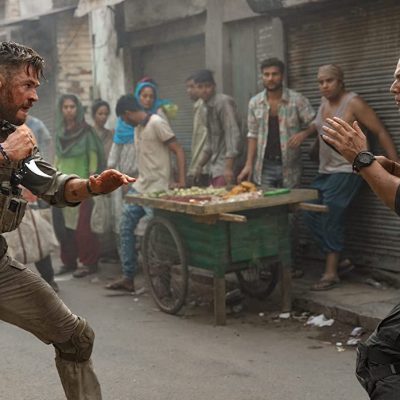Capone Review: Tom Hardy Misfires
There’s a cathedral on Chicago’s North Side that I liked visiting as a kid. In its cornerstone, a bullet hole still lingers nearly a century after it shattered the rock: a leaden forget-me-not of the day Al Capone’s gunmen executed Earl “Hymie” Weiss on the church steps. Growing up, it was like communing with a mythological past. But then the less you know about wiseguys and gangsters, the grander they can appear.
The real Al Capone was obviously not a mythic figure or a comic book supervillain; he was a thug with a gun and a big mouth who died of neurosyphilis, possibly forgetting his own name before the end. Yet Tom Hardy and writer-director Josh Trank attempt to make latter day Capone larger-than-life, even as their movie is one that spends its 100 minutes focusing on how much Capone pooped himself during that last year.
If you squint, you can almost see the planned small scale epic about how the mighty fall; Capone’s intentions are like the fake alligators in the lake outside Al’s Florida home—highly noticeable. But by wallowing in the filth of Capone’s final days, the movie fails to add a sense of irony to its romanticized outlaw; it just appears bloated and on the verge of parody.
Set in 1946, Capone picks up after World War II is over and Prohibition is a distant memory. In fact, everything is a distant memory for Alphonse Capone (Hardy), who prefers going by “Fons” nowadays. Calling him Al is strictly forbidden in Florida, not that he might notice given how crusty Hardy plays him. With a perpetual case of the mumbles, Hardy’s tough guy flops around the everglades, needing subtitles even when he’s speaking in English, and playing with a motley crew of children as if he were Brando in the last reel of The Godfather.
But unlike Brando, it’s hard to feel much sympathy for Hardy’s senile crime boss, who only ever comes alive when it’s time for cartoonish splashes of fantasy violence—be it from Capone’s delusions or the absurd ones imagined by Trank’s otherwise listless screenplay. When he isn’t chomping on cigars or carrots (the second given to him by doctors to ward off smoking), he’s belittling his wife Mae (Linda Cardellini) or the son who’s actually there (Noel Fisher). Meanwhile some feds linger in the bushes on the other side of the lake, convinced it’s all an act and Big Al has a treasure chest buried somewhere in the swamp.
What might surprise those daring or desperate enough to rent Capone during quarantine is how unlike its trailer the finished product is. Rather than being the last act of Robert De Niro’s mischievous big bad from The Untouchables—one marketing suggests was merely feigning dementia when he got out of Alcatraz—Trank’s Capone really is a character study about an old man who cannot grasp the shape of the regret he feels. More interested in long sequences about Fons drooling on himself and calling his wife a whore in Italian than in some final Machiavellian plot, on paper Capone should be a poignant drama about a monster made pitiful by the ravages of time. You know, like the end of Martin Scorsese’s The Irishman, to reference another masterful De Niro performance.
Only the problem is this ain’t Scorsese, and as entertaining as Hardy is, he isn’t reaching for De Niro gravitas. While one imagines Hardy saw the potential of playing Vito Corlone’s final scene over several hours in the screenplay, the performance and material is a muddled mix, leaving Hardy to his own devices of mugging while Cardellini gets saddled with even more thankless supporting work than she endured in Green Book. The only time Hardy and the movie perk up is during its most disastrous flourishes.
It’s the big scenes where Hardy gets to chew scenery that devolve into farce, such as when he screams over imagined mutilations in his bed, or high camp when he finds a gold-plated Tommy gun that he then walks around his property in a bathrobe and diaper, with carrot half-slipping from his mouth. Hardy is less a caged animal here than Bugs Bunny doing a bad Edward G. Robinson impersonation. And rather than eliciting tears for this clown, those moments will only be remembered for the memes they’ll surely spark.
Hardy remains one of the most interesting actors of his generation. Often showcasing a fearless ability to walk the line between inhabiting characters and mugging for the camera (and audio mixers), he does not make small choices. But sometimes he’ll make very bad ones, and it takes a good script and director to rein him in from such self-destruction. While I still enjoy Trank’s first movie, Chronicle, a good deal, it is apparent he and Hardy developed a co-dependency for indulging their worst impulses on Capone, and the result is a movie so bizarre that its value to the Capone myth can be summed up in a carrot-chomping gif.
The post Capone Review: Tom Hardy Misfires appeared first on Den of Geek.
From https://www.denofgeek.com/movies/capone-review-tom-hardy/



